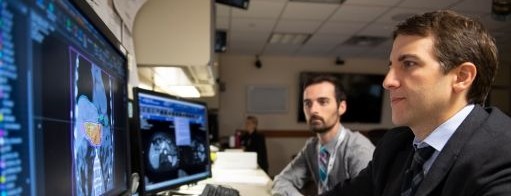
Wall Street Journal: More young people are getting colorectal cancers
UC expert comments on American Cancer Society study
A new study from the American Cancer Society (ACS) found a larger share of colorectal cancer patients are being diagnosed at younger ages and with more advanced stages of the disease.
The study reported that in 2019, 20% of new colorectal cancer diagnoses were in patients younger than 55, while only 11% of cases in 1995 were diagnosed in this younger population. Approximately 60% of 2019 colorectal cases were diagnosed at advanced stages, compared to 52% in the mid-2000s.
While it is not fully known what is causing colorectal cancer rates to rise in younger people, one theory is that environmental changes and specific diets can be affecting the makeup of microorganisms in people's bodies, known as the microbiome.
Jordan Kharofa, MD, associate professor in the University of Cincinnati Department of Radiation Oncology, a University of Cincinnati Cancer Center member and a UC Health physician, has published research on how diet and the microbiome could affect colorectal cancer and commented on the new study for the Wall Street Journal.
The ACS study reported about 43% of diagnoses of colorectal cancer in patients under age 50 are in people ages 45 to 49, but Kharofa said "there are a good portion that are still younger than 45."
Kharofa's research found two species of bacteria most closely associated with causing colorectal cancer were not found in higher levels among younger patients, meaning they were unlikely to be responsible for the increased cancer rates. But five other bacteria were found in higher levels, including one species associated with a sulfur microbial diet.
A sulfur microbial diet is high in processed meats, low-calorie drinks and liquor and low in raw fruits, vegetables and legumes.
“Although these patients aren’t obese, there may be dietary patterns that happen early in life that enrich for certain bacteria such as this one,” Kharofa said. “It’s not that what you’re eating has carcinogens in them, but the byproducts produced during bacteria metabolism may lead to carcinogenic chemicals. It’s possible that interactions between diet and the microbiome may mediate the formation of colorectal cancer cells and heightened risk in younger populations over the last several decades.”
Read the Wall Street Journal article.
Featured photo at top of Dr. Kharofa, right. Photo/Colleen Kelley/UC Marketing + Brand.
Related Stories
President picks exceptional talent
April 28, 2021
The University of Cincinnati 2021 Presidential Leadership Medal of Excellence Awards honor six undergraduate scholars for scholarship, leadership, character, service and the ideals of the university. Awardees are spotlighted for exceptional academics, creativity, community service and innovation.
Grad students earn president's highest honor
April 28, 2021
The University of Cincinnati 2021 Presidential Medal of Graduate Student Excellence Awards honor three graduate scholars for scholarship, leadership, character, service and the ideals of the university. Awardees are spotlighted for exceptional academics, creativity, community service and innovation.
Finding community and building a future
July 9, 2021
As a University of Cincinnati College of Medicine student, Sarah Appeadu, MD, ’21, remembers journaling on the “3 Cs” that got her through medical school: Community, community, community. Now, when she lists the people who supported her through four years of training—the last year in a global pandemic—it keeps growing: her family, her church, her classmates, and the college’s Office of Student Affairs and Office of Diversity, Equity and Inclusion. “I look back and it was such a crucial time to really be nurtured in that way,” she says. “I’m so thankful that I had those people. It shows being around the right people really mattered. That’s my same hope for residency even.”
